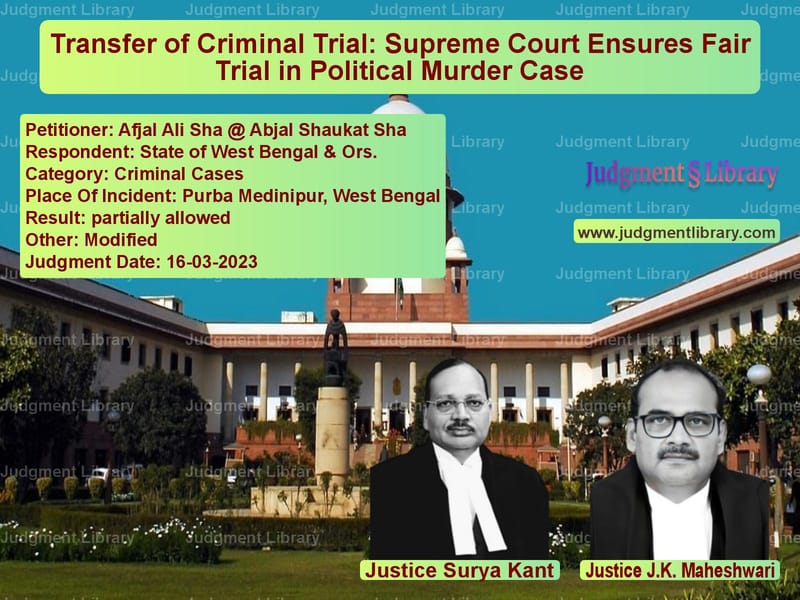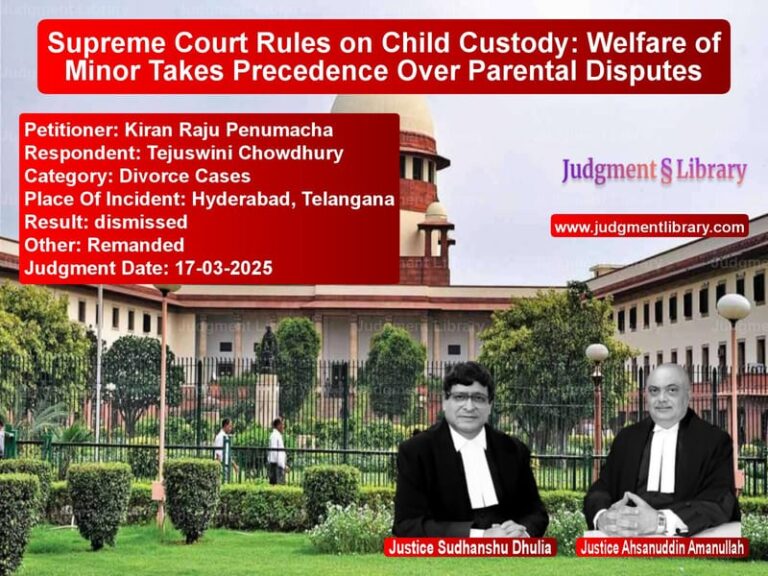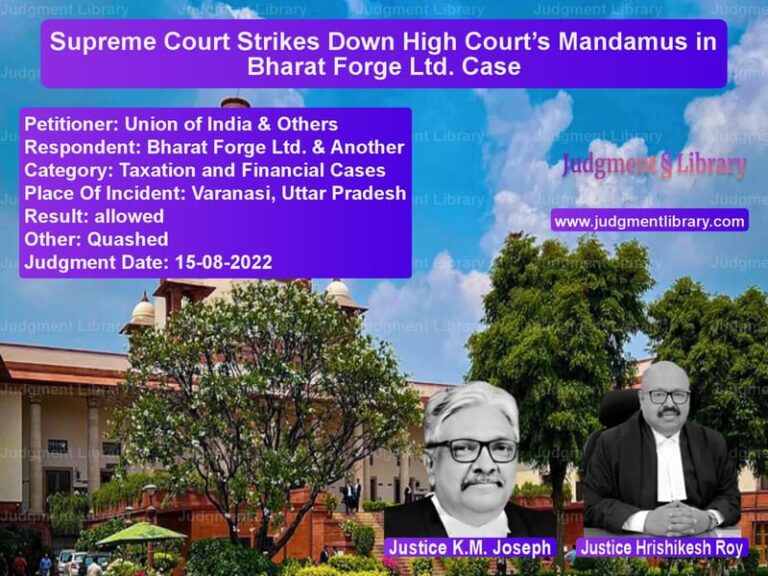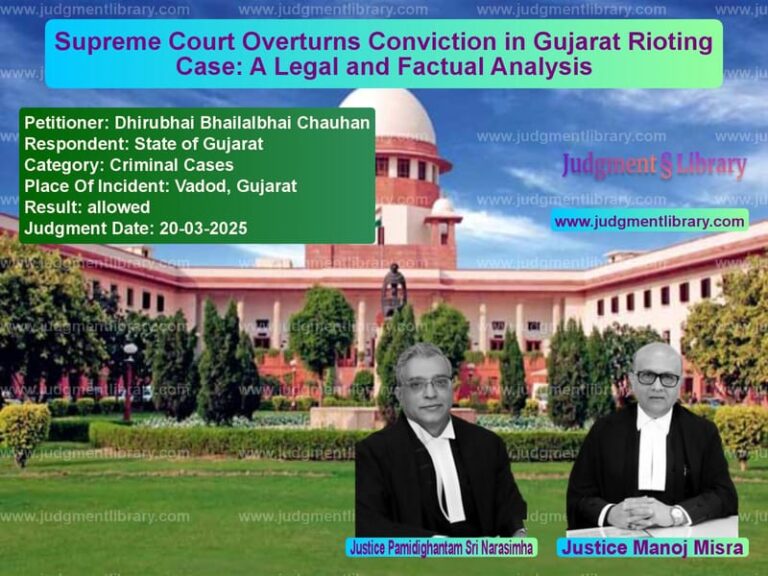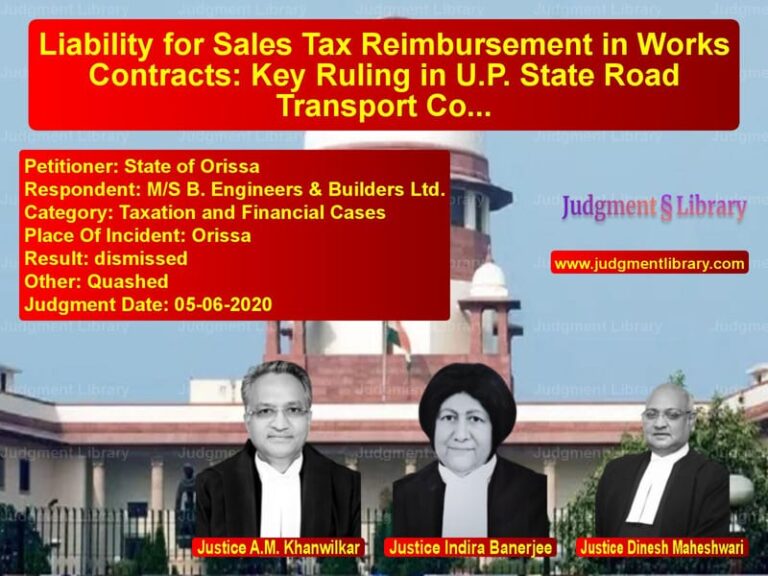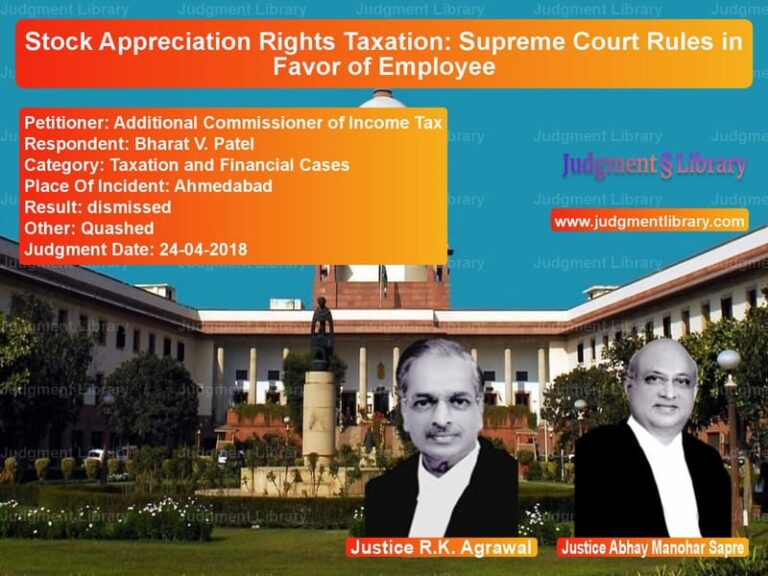Transfer of Criminal Trial: Supreme Court Ensures Fair Trial in Political Murder Case
The case of Afjal Ali Sha @ Abjal Shaukat Sha v. State of West Bengal & Ors. revolves around a criminal trial concerning the alleged murder of Kurban Sha. The petitioner sought the transfer of the criminal case from West Bengal to Assam, citing political influence, threats to witnesses, and the compromised role of the prosecution. The Supreme Court was called upon to decide whether a fair trial was possible within the state or if a transfer was necessary to uphold justice.
The case sheds light on the fundamental principle of fair trials and the judiciary’s role in ensuring impartiality, especially when political influence is alleged. The Supreme Court, while refraining from transferring the case outside West Bengal, provided stringent safeguards to ensure an unbiased trial.
Background of the Case
The dispute originated from the alleged murder of Kurban Sha on October 7, 2019. According to the FIR:
- The deceased was shot in the neck by unidentified assailants while working at a political party office.
- His nephew, Jahar Sha, lodged an FIR under Section 302 read with 120B of the IPC and Sections 25 and 27 of the Arms Act, 1959.
- The police later implicated eleven individuals in the crime and submitted a charge sheet with 107 witnesses.
- The case was assigned to the Additional Sessions Judge, 3rd Court, Tamluk, Purba Medinipur, West Bengal.
Arguments by the Parties
Arguments by the Petitioner (Afjal Ali Sha)
The petitioner, brother of the deceased, argued that:
- The West Bengal government issued a notification on February 26, 2021, instructing the prosecution to withdraw the case without justification.
- The newly appointed Public Prosecutor moved an application under Section 321 CrPC to withdraw the prosecution, which was promptly granted by the trial court.
- The case withdrawal was politically motivated, as the accused had ties to the ruling party.
- The trial was marred by intimidation of witnesses, leading to some of them turning hostile.
- The petitioner and his family members were threatened, and false cases were lodged against them to deter them from pursuing justice.
- The de-facto complainant (Jahar Sha) was influenced to withdraw his statement and support the accused.
- Respondent No. 2 (the prime accused) had at least 34 criminal cases against him.
- Local courts could not ensure a fair trial due to political pressure, necessitating a transfer to Assam.
Arguments by the Respondents (State of West Bengal & Accused)
The respondents, including the state government and the accused, countered that:
- The petitioner had no locus standi as he was neither the complainant nor a victim but merely a witness.
- The allegations of witness intimidation were unsubstantiated.
- The decision to withdraw the prosecution was legitimate and based on a lack of evidence.
- The trial court rejected multiple bail applications of the accused, proving its impartiality.
- Transferring the case would inconvenience the 107 prosecution witnesses, most of whom were Bengali-speaking.
- Security was provided to the petitioner and key witnesses.
- The accused had been in custody for over three years without trial, causing undue hardship.
Supreme Court’s Legal Analysis
Applicability of Section 406 CrPC
The Supreme Court reiterated that a criminal trial can be transferred under Section 406 CrPC if:
- There is a reasonable apprehension that justice will not be done.
- The state machinery is compromised or acting in favor of the accused.
- Witnesses are being influenced, threatened, or attacked.
- The prosecution is deliberately undermining the case.
The Court observed:
“The power of transfer is to be exercised cautiously and in exceptional situations where it becomes necessary to provide credibility to the trial.”
Role of the State in Case Withdrawal
The Supreme Court criticized the West Bengal government’s move to withdraw the prosecution, stating:
“The decision to withdraw the case was taken at the government level, and the Public Prosecutor was merely instructed to act upon it. This is contrary to the scheme of Section 321 CrPC, where the prosecutor must apply independent legal judgment.”
Threats to Witnesses and Fair Trial Concerns
The Court noted instances of witnesses turning hostile and emphasized the need for a secure trial environment. However, it balanced this against the inconvenience of transferring the trial to another state, particularly given that 90 prosecution witnesses had yet to be examined.
Final Judgment by the Supreme Court
The Supreme Court decided not to transfer the trial outside West Bengal but imposed stringent safeguards:
- The case was transferred from Purba Medinipur to the Chief Judge, City Sessions Court, Calcutta.
- The trial would be conducted only by the Chief Judge and not delegated to any other judge.
- The trial would be conducted on a weekly basis and completed within six months.
- A Special Public Prosecutor would be appointed based on recommendations of the Chief Judge, with prior approval from the High Court.
- Key prosecution witnesses, including the petitioner and the deceased’s wife, would receive adequate security.
- The prime accused (Respondent No. 2) and other accused in custody would be shifted to Central Jail, Calcutta.
- The accused would not be granted bail until the trial concluded, except by the High Court.
- The Calcutta High Court would monitor and supervise the trial.
Impact of the Judgment
The ruling ensures:
- A fair trial within West Bengal while avoiding unnecessary logistical complications.
- Stringent safeguards to prevent witness tampering or political influence.
- Accountability of the prosecution and judiciary to conduct the trial impartially.
- Expedited proceedings to prevent undue delays.
Conclusion
The Supreme Court’s decision in Afjal Ali Sha v. State of West Bengal upholds the principle of fair trials while balancing practical considerations. The judgment ensures that justice is served by transferring the case to a neutral jurisdiction within the state, providing security to witnesses, and enforcing judicial oversight.
Read also: https://judgmentlibrary.com/supreme-court-acquits-guna-mahto-in-murder-case-due-to-lack-of-evidence/
Petitioner Name: Afjal Ali Sha @ Abjal Shaukat Sha.Respondent Name: State of West Bengal & Ors..Judgment By: Justice Surya Kant, Justice J.K. Maheshwari.Place Of Incident: Purba Medinipur, West Bengal.Judgment Date: 16-03-2023.
Don’t miss out on the full details! Download the complete judgment in PDF format below and gain valuable insights instantly!
Download Judgment: afjal-ali-sha-@-abja-vs-state-of-west-bengal-supreme-court-of-india-judgment-dated-16-03-2023.pdf
Directly Download Judgment: Directly download this Judgment
See all petitions in Murder Cases
See all petitions in Bail and Anticipatory Bail
See all petitions in Judgment by Surya Kant
See all petitions in Judgment by J.K. Maheshwari
See all petitions in partially allowed
See all petitions in Modified
See all petitions in supreme court of India judgments March 2023
See all petitions in 2023 judgments
See all posts in Criminal Cases Category
See all allowed petitions in Criminal Cases Category
See all Dismissed petitions in Criminal Cases Category
See all partially allowed petitions in Criminal Cases Category

